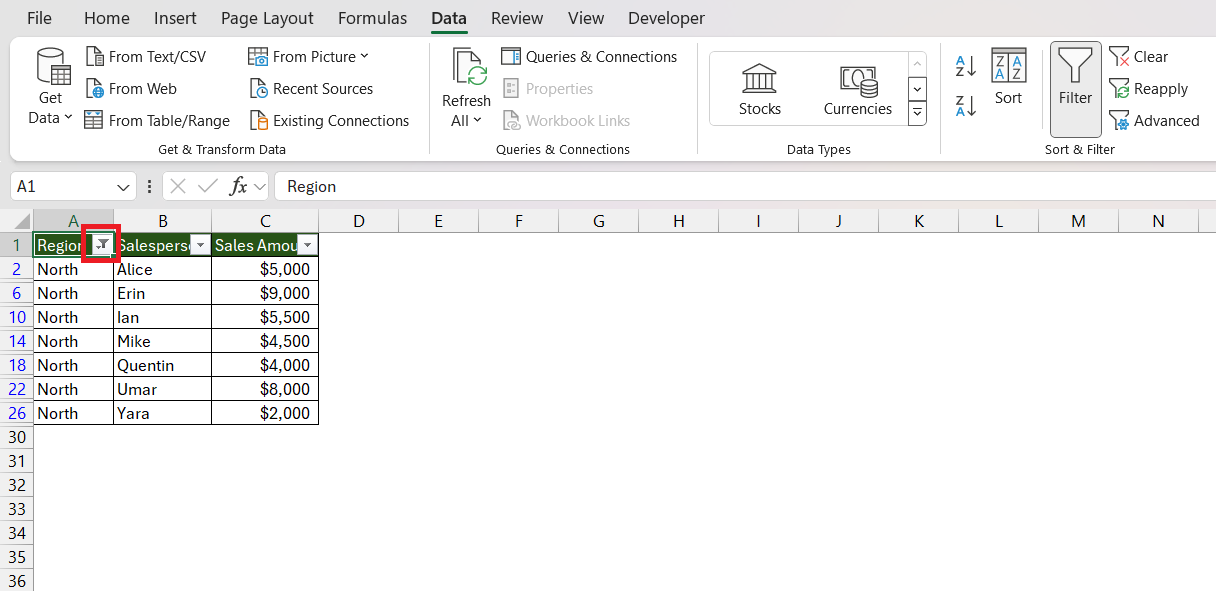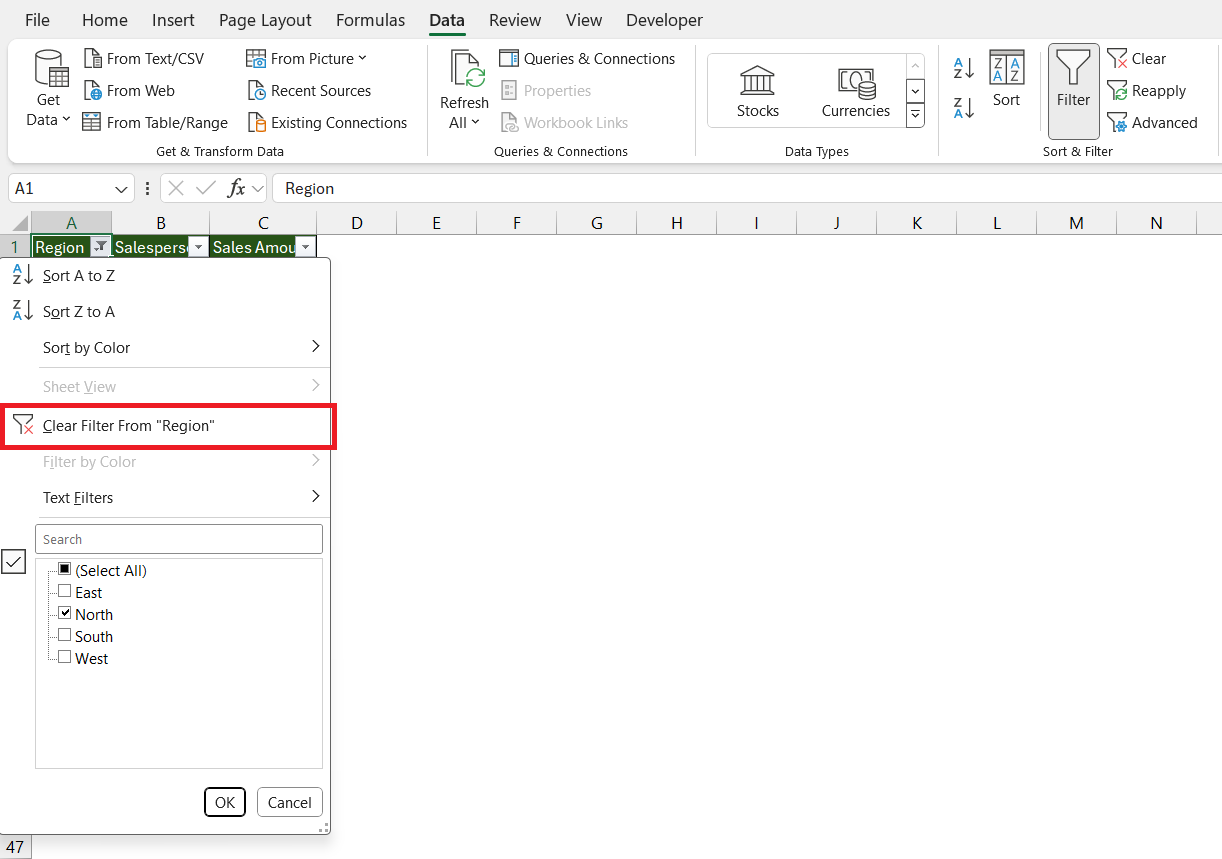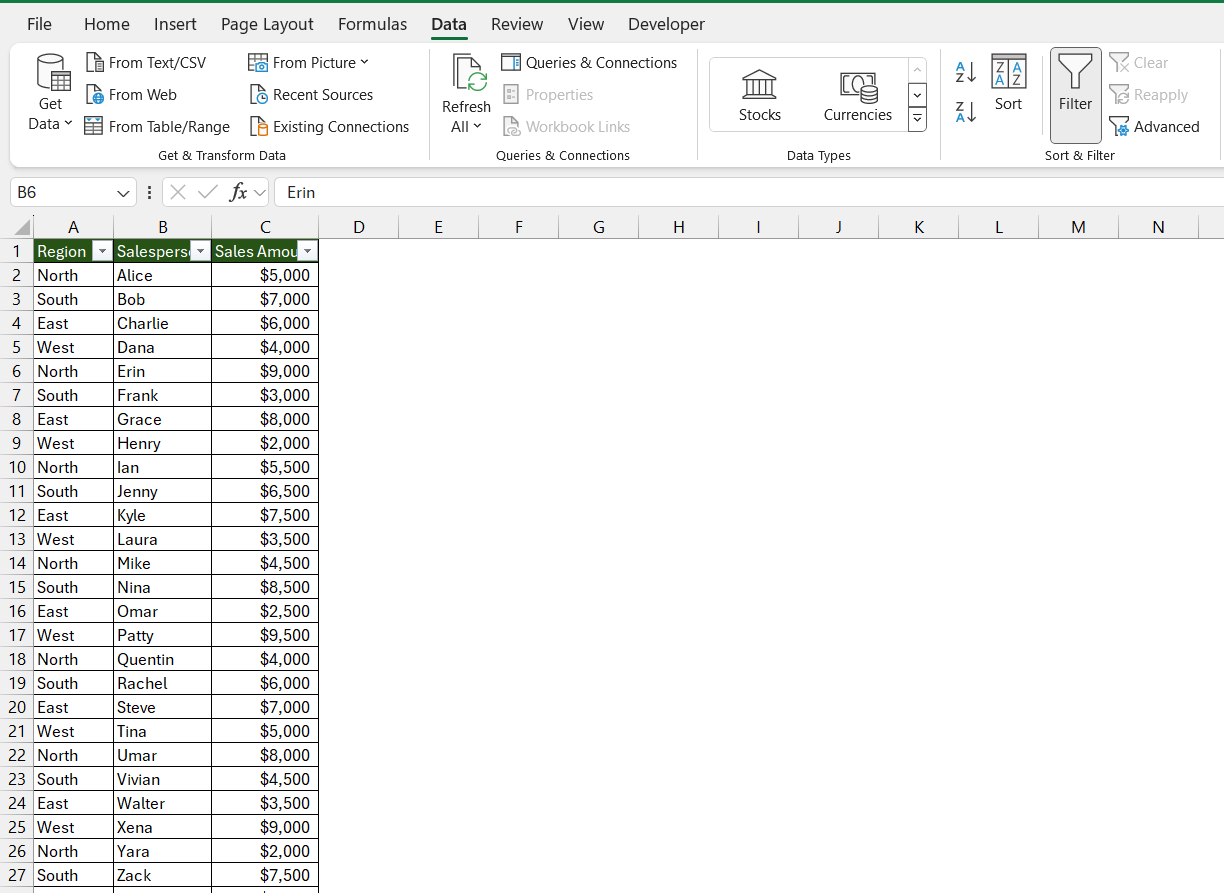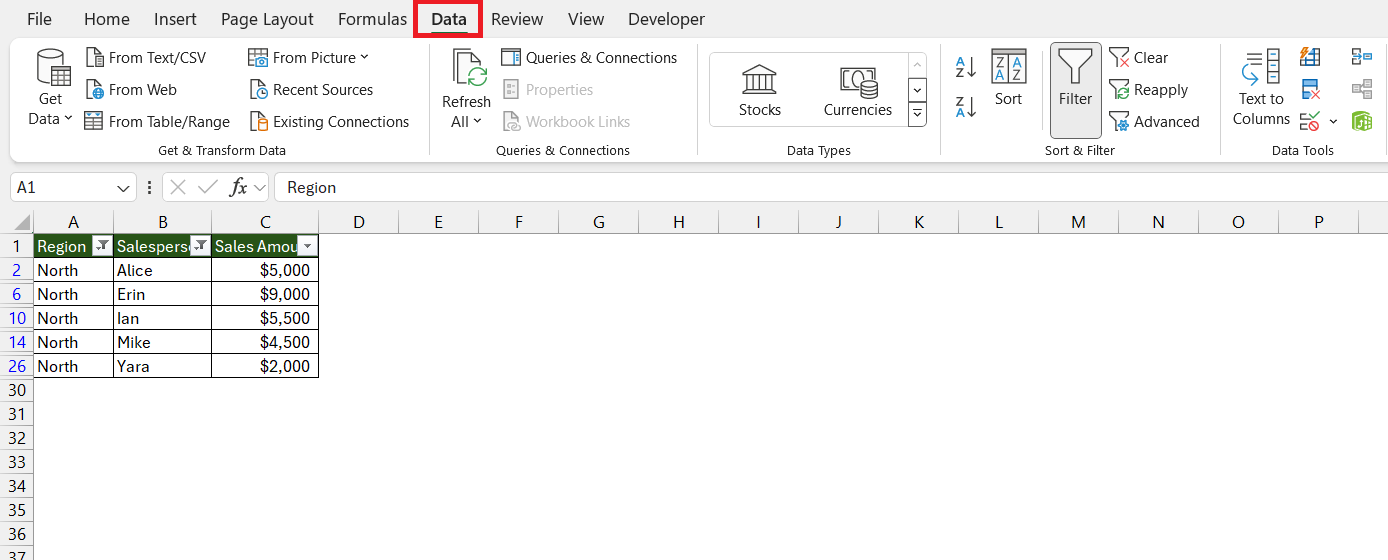Excel filters are your best friend when it comes to managing a sea of data. They act like magnets, drawing out the nuggets of information you need, whether that’s to isolate sales performance, pinpoint customer preferences, or find a string of text among columns and rows. Learning to clear filters in Microsoft Excel is essential, akin to knowing how to reset a stopwatch for the next round of analysis.
Key Takeaways
- Clearing Single Column Filters: Quickly clear filters from a single column to reveal all data points without affecting other filters.
- Removing All Filters: Use the “Data” tab to efficiently remove filters across all columns, offering a complete view of your dataset.
- Shortcut Keys for Quick Removal: Embrace keyboard shortcuts like Alt + A + C to clear all filters, speeding up your Excel navigation and data exploration.
- Troubleshooting Filter Issues: When filters malfunction, reapply the filter, check for blank rows, or ensure full range coverage.
Table of Contents
Introduction to Excel Filter Functionality
Understanding the Basics of Excel Filters
Excel filters are your best friend when it comes to managing a sea of data. Picture a spreadsheet with a wealth of data points; filters act like magnets, drawing out the nuggets of information that you need. With filters, you can isolate sales performance, pinpoint customer preferences, or simply find a string of text among columns and rows.
The Importance of Mastering Filter Removal
Learning to clear filters in Excel is like knowing how to reset a stopwatch; it prepares you for the next round of analysis with a clean slate. Mastering filter removal ensures that you don’t miss out on crucial data hidden by previous filters, and it keeps your dataset pristine for accurate assessments. Whether you’re prepping for a presentation or digging into a thorough audit, the ability to remove filters is key to maintaining the integrity and breadth of your insights.
Step-by-Step Guide to Clear Filters in Excel
How to Remove Filters from a Single Column Quickly
Clearing filters from one specific column without affecting the rest of your data is straightforward and can save you from unnecessary rework:
STEP 1: Navigate to the top of the column you wish to modify.
STEP 2: Locate the column’s heading and press where you’ll see a filter icon resembling a small funnel.
STEP 3: Click on this icon to unveil the filter drop-down menu. Choose the “Clear Filter from [Column Name]” option to cleanse the column of its current filter setting.
That’s it! Your chosen column is now filter-free, revealing all available data points in that particular field while retaining other column filters intact.
Make sure to reapply any necessary filters once your immediate task is complete.
Strategies for Clearing All Filters Across Multiple Columns
When you’re working with data tables that span multiple columns, you might need to remove all filters to completely view your dataset. Here’s how to efficiently clear filters across all columns:
STEP 1: Go to the “Data” tab on the Ribbon.
STEP 2: In the “Sort & Filter” group, click on “Clear.”
This action will remove all filters from the active worksheet, providing you with an unfiltered view of your data.
Troubleshooting Common Excel Filter Issues
What to Do When a Filter Isn’t Working Properly
When your Excel filter doesn’t behave as expected, don’t panic. Here are steps to troubleshoot and resolve the issue:
- Reapply the Filter: Sometimes the simplest solution is the best one. Try reapplying the filter to ensure it wasn’t a minor glitch.
- Check for Blank Rows: Filters may stop at blank rows. Inspect your dataset and remove any blanks, then apply the filter afresh.
- Remove Partial Ranges: Ensure the filter covers the full range of data. You can manually extend the filter to include any newly added information.
Remember, if problems persist, there’s always the help feature in Excel or the Microsoft support website for more detailed guidance.
Enhancing Your Workflow
Tips for Efficiently Managing and Reapplying Filters
To keep your data analysis swift and effective, consider these tips:
Quick Filter Toggles: Get into the habit of quickly toggling filters on and off to refresh your view of the data set without losing your place. This keeps your workflow fluid.
Save Filter Settings: If you frequently use specific filters, save these settings as a custom view or a template to avoid setting them up each time.
Use Color Coding: Apply color to cells or text as a visual cue, which can be easily filtered and identified.
Keep Track of Multiple Filters: When dealing with multiple filters, document or take note of filter combinations that yield the most insightful results.
Refresh Before Reapplying: Before reapplying filters, make sure your data is updated. Refresh any connected data sources to avoid filtering stale data.
By integrating these tactics into your routine, you’ll spend less time wrestling with filters and more time uncovering the gems in your data.
Utilizing Shortcut Keys to Speed Up Filter Removal
To streamline your Excel experience, embrace the power of keyboard shortcuts:
- Clear All Filters: Strike
Alt + A + Cto wipe clean all active filters in your worksheet like a chalkboard. - Toggle Filters On/Off: Use
Alt + D + F + Fto swiftly switch filtering on or off for your selected data range.
These key combinations serve as your Excel machete, cutting through the underbrush of filter settings and leaving you with a clear path forward in your data exploration.
FAQs
What is an Excel filter?
An Excel filter is a powerful tool that allows you to display only the rows that meet certain criteria, simplifying the task of parsing through extensive datasets. It’s ideal for focusing on specific information and is a staple in data analysis and organization.
How do I clear all filters in Excel?
To clear all filters in Excel, go to the ‘Data’ tab, find the ‘Sort & Filter’ group, and click on ‘Clear’. All the filters in every column of your worksheet will be removed, revealing the full data set.
Why can’t I remove filter on Excel?
If you can’t unfilter in Excel, it might be due to a protected sheet, hidden rows or columns interfering, or a glitch. First, ensure the sheet is unprotected and then try reapplying and clearing the filter again. If issues persist, check for updates or restart Excel.
How Can I Clear a Filter Without Affecting Other Columns?
To clear a filter from one column without affecting others, click the filter icon in that column’s header, then select “Clear Filter from [Column Name].” This action will only remove the filter from the specified column.
Is There a Keyboard Shortcut to Clear All Filters in Excel?
Yes, to clear all filters in Excel using a keyboard shortcut, simply press Alt + A + C on Windows. This will remove all the active filters from your worksheet.
John Michaloudis is a former accountant and finance analyst at General Electric, a Microsoft MVP since 2020, an Amazon #1 bestselling author of 4 Microsoft Excel books and teacher of Microsoft Excel & Office over at his flagship MyExcelOnline Academy Online Course.












